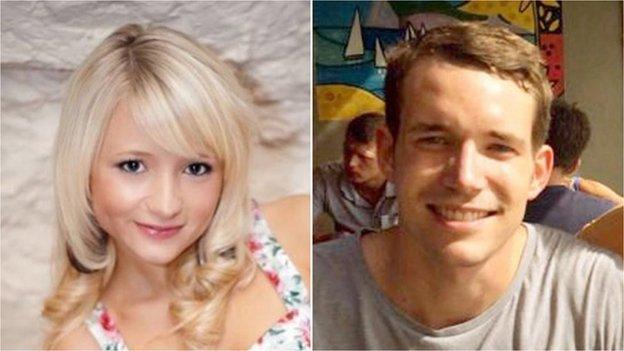Thailand's paradise island murder mystery
- Published
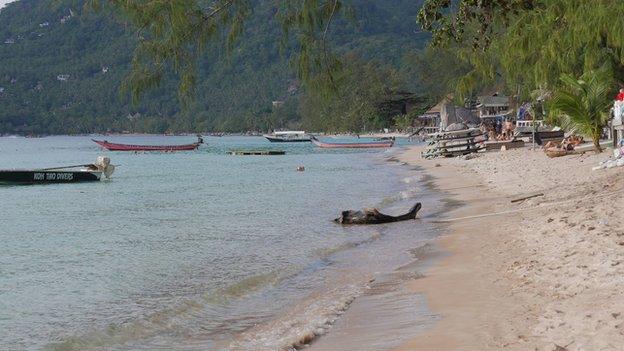
Koh Tao has a population of about 2,100 people
It is as incongruous a scene as you are likely find for such a shockingly violent crime.
A small, sandy cove, hemmed all around by tall, rounded rocks, lapped by the turquoise seas that you get around Koh Tao.
Right behind it, climbing the hill, are the Ocean View Bungalows, typically unglamorous, functional accommodation that feature in abundance at the low end of resorts all over Thailand.
That is where Hannah Witheridge and David Miller were staying, and where they were presumably heading when they were murdered in the early hours of Monday morning.
Had this happened in one of Thailand's larger and more rowdy resorts, it would have been less shocking.
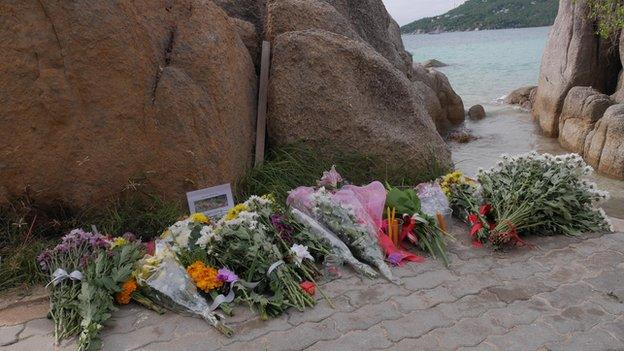
The number of British citizens murdered in Thailand since 2009 is now 13
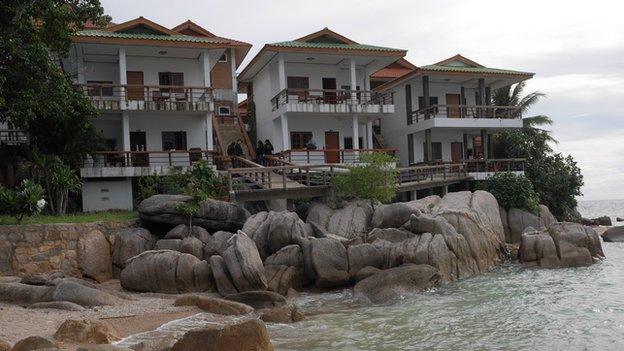
Ms Witheridge and Mr Miller may have been heading back towards the Ocean View Bungalows when they were attacked
It is no secret that well-established locations like Pattaya, Phuket, Koh Samui and Koh Phangan have an ugly underbelly of crime, racketeering, drugs and prostitution, even though many tourists may remain blissfully unaware of these aspects.
But Koh Tao? Named after its turtle-like shape - Tao is Thai for turtle - or perhaps it was in the past a major breeding ground for turtles, the island was uninhabited after a penal colony was shut down there in 1947.
Koh Tao came late to the tourist boom that swept other Thai islands in the 1980s and 90s, and has remained far less developed, with a resident population of just a few thousand, and visitors who come for the excellent diving and slower pace of life.
Talking to local people, who are clearly appalled and distressed by the murders, the one thing they say repeatedly is that nothing like this has ever happened on Koh Tao before.
Westerners, who have settled on the island, talk of the small, tight-knit community, where everyone knows each other. Who could possibly have committed such a ghastly crime, which has cast a shadow over this idyllic tropical paradise?
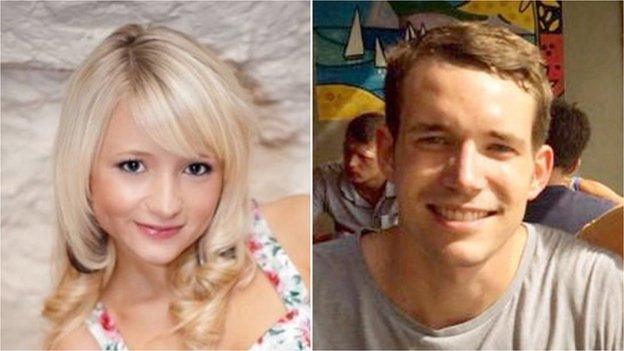
Ms Witheridge and Mr Miller were found close to the bungalows where they had been staying
Watching the Thai police struggle to answer this mystery, with the eyes of the world on them, has felt like being part of a sometimes farcical performance, in which we, the media, are the audience.
On arriving the day after the murders, the senior police officer on the island assured us the culprit could not have been a Thai person. No Thai could possibly commit such a crime, he said, forgetting the equally ghastly murder of Welsh tourist Katherine Horton in 2006, by, it turned out, two Thai fishermen.
On that occasion they were caught in an efficient police operation that lasted just one week.
Jealousy
So having ruled out the Thais, the police focused their investigation on the large Burmese migrant worker population on Koh Tao.
They cited two CCTV images as crucial evidence.
One showed a couple they believed to be David Miller and Hannah Witheridge leaving a bar just before they were killed.
The other showed an Asian-looking man they thought might have been following the couple. But it turned out the CCTV image showed a completely different couple. And the seemingly random DNA samples taken from five Burmese men did not match any found on the victims' bodies.
Then another police chief said he believed the murders had been a crime of passion - hinting that jealousy might be the motive.
By then the police were directing their efforts to two of David Miller's friends who had been travelling with him in Thailand, Christopher and James Ware - but they too have now been cleared.
So the police are going back to the Burmese communities again, checking their documents, searching their homes.
And, four days on, a police officer has finally admitted that yes, perhaps the perpetrator might be Thai after all.
But as people were never stopped from leaving the island, despite claims to the contrary, the killer could by now be far away.
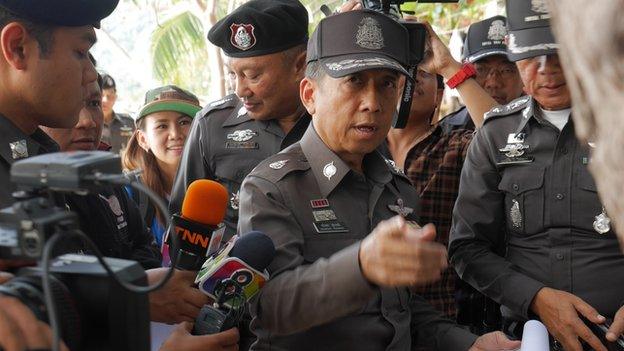
Police General Jarumporn Suramanee is leading the investigation
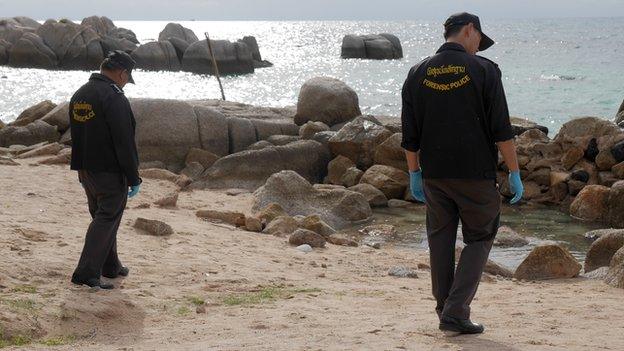
Evidence shows Ms Witheridge died from head wounds and Mr Miller died from severe blows to the head and drowning
And while publicly residents express disbelief over this crime, privately they are less surprised.
"They've had this coming," one man told me, referring to the island's big business owners. "They've let things get out of control."
He said too many criminal elements had been coming over from Koh Phangan to take advantage of the growing bar and beach party scene on Koh Tao.
Another local told me that the bar the two British victims had been at before they died was notorious for its hard-drinking scene, with groups of aggressive, intoxicated men creating an intimidating atmosphere.
Could it have been from there that they were followed, down on to the beach?
People talk about some powerful families on Koh Tao who are pushing unsustainable development, building bars and hotels with little regard for the environment or the laid-back vibe that has attracted so many westerners.
If this is the case, it simply reflects the pattern of development in almost every other beach resort in Thailand - loose law-enforcement, plenty of minor crime, and a reckless pursuit of profit by landowners to the point where they are slowly destroying the very beaches, coasts and seas that tourists enjoy.

It is now very hard to find unspoiled natural beauty along its 1,600 miles of coastline.
The British Embassy travel warnings for Thailand are a sobering reminder of the seamier side of its resorts.
It states: "Western tourists have been victims of vicious, unprovoked attacks by gangs in Koh Phangan. These attacks are particularly common around the time of the Full Moon parties and generally occur late at night near bars in Haad Rin on Koh Phangan.
"There have been sexual assaults against foreign men and women."
The deaths of David Miller and Hannah Witheridge now bring the total number of British citizens murdered in Thailand since 2009 to 13.
So is Thailand a safe place to visit? For the most part, yes.
But do not be fooled by the smiles and the glossy posters put out by the tourism authority. The reality behind them is an unequal, profit-driven economy, much of it illegal - and a police force which has shown time and again its incapacity for controlling crime.
- Published18 September 2014
